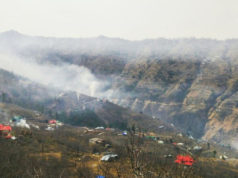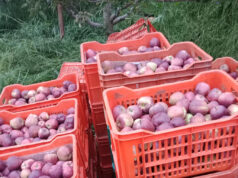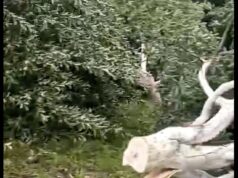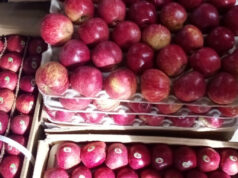Proper Crop Management Practices Essential to Mitigate Apple Foliar Diseases; University Recommends Specific Fungicides and Miticides to Control Apple Foliar Diseases
Nauni, Solan – In response to increasing reports of apple foliar diseases from various regions, the Department of Plant Pathology at Dr. YS Parmar University of Horticulture and Forestry (UHF) Nauni has conducted a detailed assessment of the situation. Three scientific teams from UHF Nauni, KVK Shimla, and KVK Kandaghat have visited numerous apple orchards across the state to evaluate the prevalence and severity of these diseases.
University scientists claimed that orchards adhering to the recommended pesticide spray schedule exhibited minimal disease severity. To further investigate, the university has dispatched four additional teams to other apple-growing areas in the state.
Factors Contributing to Disease Severity
Several factors were identified as exacerbating the severity of foliar diseases:
- Adverse Climatic Conditions: Reduced rainfall from November 2023 to July 2024 and intermittent rain in June 2024 created favourable conditions for disease development.
- Pest Infestations: High mite populations increased tree stress, facilitating disease progression.
- Imbalanced Crop Management: Non-judicious use of chemical sprays, including the mixing of nutrients, insecticides, and fungicides, led to phytotoxicity and weakened plant health.
- Pre-existing Plant Stress: Conditions like root rot, collar rot, and canker weakened tree vigor, making them more susceptible to infection.
University Recommendations
The university has issued the following advisory to help apple growers manage and mitigate the spread of foliar diseases:
- Enhance Air Circulation: Proper pruning, removal of weeds and infected plant debris, and soil moisture management can reduce disease pressure.
- Appropriate Fertilization: Promotes overall plant health and resistance to diseases.
- Judicious Use of Chemicals: Use fungicides and insecticides as per recommended dosages and spray intervals. Avoid unapproved mixing and repeated use of the same product.
- Alternative Management Strategies: Implement regenerative or natural farming practices to improve soil health and disease resistance.
- Consistent Orchard Surveillance: Early detection and timely intervention are crucial for disease control.
- Manage Pre-existing Conditions: Address root rot, collar rot, and canker to maintain overall tree health.
Specific Fungicide and Miticide Recommendations
For Alternaria leaf spot/blight and other leaf spots:
- Preventative Spray: Mancozeb (600gm/200L of water).
- Severe Cases: Hexaconazole 4% + Zineb 68% WP (500gm/200L of water) or Carbendazim 25% + Flusilazole 12.5% SC (160ml/200L of water) at 10-12 day intervals.
For mite management:
- Fenazaquin: 50ml per 200L of water.
- Propargite: 200ml per 200L of water.
- If previously used miticides: Propargite 42% + Hexythiazox 2% EC (200ml) or Cyenopyrafen 30% SC (50ml per 200L of water).
The Department of Plant Pathology emphasizes the importance of following these guidelines meticulously to protect apple crops and ensure a healthy harvest.
Earlier, scientists from UHF Nauni conducted a detailed assessment of the situation. Three scientific teams from UHF Nauni, KVK Shimla, and KVK Kandaghat visited numerous apple orchards across the state to evaluate the prevalence and severity of these diseases.
The field visits targeted orchards in Chopal (Deha, Chambi, Khagna-Roo, Mandal, Deiya, Bhanal, Kiyar), Rohru (Sheikhal, Dhara, Kamoli, Samoli, Karalash, Kharla, Kadiyon), Kotkhai (Bhadaich, Matlu, Bagi, Sheglta, Ratnari, Panog, Badeiyon, Jashla, Deyorighat), and Jubbal (Nandpur, Ruyildhar, Kathasu, Batargalu). The primary objective was to assess the spread of Alternaria leaf spot/blight and other leaf spot diseases, educate farmers through awareness camps, and provide guidance on effective management strategies.
Based on visual assessments and microscopic observations, scientists determined that Alternaria and other fungal species were the primary causes of the leaf spot/blight diseases. Disease severity varied across regions, with the following average levels recorded:
- Kotkhai: 0-30%
- Jubbal: 0-20%
- Rohru: 0-20%
- Chirgaon: 0-15%
- Theog: 0-10%
- Chopal: 0-4%
The efforts of UHF Nauni and its collaborating teams highlight the importance of proactive disease management in maintaining the health and productivity of apple orchards in Himachal Pradesh. By following the university’s recommendations and adopting proper crop management practices, apple growers can effectively combat foliar diseases, ensuring the sustainability and profitability of their orchards. Continuous monitoring, judicious use of chemicals, and adherence to recommended practices will be key to overcoming these challenges and securing a healthy harvest.










